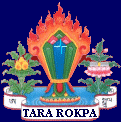 |
Extracts from Articles by Tara Rokpa TherapistsEdie
Irwin: The simple things in life in Tara Rokpa
Edie Irwin: The simple things in life in Tara Rokpa: relaxation and massage, painting and drawing (from the booklet 'Back To Beginnings', Tara Rokpa Edinburgh 1991) One of the activities of the group in this
work is massage. Even at the simplest, most unschooled level it can
be very useful for relaxation. A compassionate motivation - the wish
to benefit the other person without expecting something in return
- is the key ingredient with this type of massage. Even if you only
practise simple massage of the hand, there is a real chance to help
the other person experience a more relaxed and open aspect of themselves.
Massage also has real benefits for the person who gives it. It provides
an opportunity to develop and express compassion in action more directly
than often seems possible. It is a way of gaining confidence in one's
own value for others and a way of breaking through our fears of touching
others. In addition, by learning more about helping others in this
way, we naturally develop an interest in our own physical existence
- which helps to dispel fear and ignorance in this area. Just as many
adults have experienced very little caring touch since childhood,
so with self-expression through colour and form. Yet playing with
colour in the way children do, provides an inexpensive, harmless outlet
for the expression of feelings which can be a direct communication
from oneself to oneself. The emphasis here is on spontaneity and on
finding a form for feelings in an uncontrived way. There is no emphasis
whatsoever on 'art'. It doesn't matter whether it 'looks good'. Sometimes
we need to let ourselves see unbeautiful sides as well as the beautiful.
An added benefit of working with colour and spontaneous imagery is
that it takes us into a part of the mind which is deeper than formal
language. When we were babies we could see and imagine long before
we could put things into words. So, when recollecting the earliest
time of our lives, expressing feelings in visual form may come much
more easily than in words.
Carol A. Sagar: Art therapy as an integral part of Tara Rokpa Art therapy does not make its goal the production of art products and artefacts, although some of these may actually come into existence. Art therapy in Tara Rokpa offers a safe environment and a non-judgmental accepting relationship. In this way, participants come to learn to trust the situation enough to use the art materials in many different ways of his or her own choice. This actually taps into the healing and creative energies which are the potential of all humanity. In order to realize this creativity, the participants use the safe psychological holding space of this work to actualise and give form and expression to their feelings relating to past, present and future. In working with the art materials ego controls are let go of, repressed material comes closer to consciousness and a process of psychological re-structuring and re-integration can follow.
Brion
Sweeney: The relevance of Buddhist methods for Western psychotherapy
In Western medicine, in the language of psychiatry and psychotherapy, in general we have a strong emphasis on pathology. There is a sense that something has to be basically wrong with a person who has difficulties. These diagnostic terms we use are very much part of our language and how we see ourselves, almost the modern equivalent of original sin. But also in the West, in some schools we have the beginning of an idea that there can be miscommunication, or miscoordination, without there necessarily being fundamental pathology, for instance in systemic theory. But this understanding is present in the East, in Buddhism, already for a long time. In Mahayana Buddhism, the Buddha taught something called 'Buddhanature' or an 'essential goodness' in the essence of each being. That is not to deny that we have conditioned and habitual ways of dealing with things that can cause problems, or that some of Freud's theories, for example the description of the ego defense mechanisms, seem very accurate. We defend ourselves against things outside of us that we fear, through various defenses and set up problems that we don't really need. But this conditioning, this way of defending ourselves, this fearfulness we have, need not necessarily be fundamental. The Buddhist notions of the mind open the possibility that we could experience the world without this defensiveness, without emotional clouds between us and reality, without the suffering created by this defendedness. That we could even find within ourselves joy, and the ability to open to further caring, and to a very full life. In the West, we may have some theoretical understanding of these matters, but our practical understanding, I am a little bit suspect of. But it seems that in the East, particularly in the Buddhist tradition, practical methods for actually undoing conditioning and becoming more in tune with this essential nature have been there for a long time. In the West we are very hungry for concepts, and we still believe somehow that if we get the right concepts, this is like the golden key that would unlock everything. However, what we perhaps need to emphasize is working with the experiental, which can involve time and hard work. Akong
Rinpoche: Tara Rokpa Therapy/Training - The meaning of the name
|
|